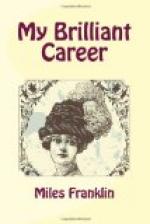“Come now, we’ll lift her once more,” said my father. At it we went again; it is surprising what weight there is in the poorest cow. With great struggling we got her to her feet once more, and were careful this time to hold her till she got steady on her legs. Father and mother at the tail and Blackshaw and I at the horns, we marched her home and gave her a bran mash. Then we turned to our work in the house while the men sat and smoked and spat on the veranda, discussing the drought for an hour, at the end of which time they went to help someone else with their stock. I made up the fire and we continued our ironing, which had been interrupted some hours before. It was hot unpleasant work on such a day. We were forced to keep the doors and windows closed on account of the wind and dust. We were hot and tired, and our feet ached so that we could scarcely stand on them.
Weariness! Weariness!
Summer is fiendish and life is a curse, I said in my heart.
Day after day the drought continued. Now and again there would be a few days of the raging wind before mentioned, which carried the dry grass off the paddocks and piled it against the fences, darkened the air with dust, and seemed to promise rain, but ever it dispersed whence it came, taking with it the few clouds it had gathered up; and for weeks and weeks at a stretch, from horizon to horizon, was never a speck to mar the cruel dazzling brilliance of the metal sky.
Weariness! Weariness!
I said the one thing many times but, ah, it was a weary thing which took much repetition that familiarity might wear away a little of its bitterness!
CHAPTER SIX
Revolt
In spite of our pottering and lifting, with the exception of five, all our cows eventually died; and even these and a couple of horses had as much as they could do to live on the whole of the thousand acres which, without reserve, were at their disposal. They had hardly any grass—it was merely the warmth and water which kept them alive. Needless to say, we were on our beam-ends financially. However, with a little help from more fortunate relatives, and with the money obtained from the sale of the cowhides and mother’s poultry, we managed to pay the interest on the money borrowed from the bishop, and keep bread in our mouths.
Unfortunately for us, at this time the bishop’s agent proved a scoundrel and absconded. My father held receipts to show that to this agent he had regularly paid the interest of the money borrowed; but through some finicking point of law, because we had not money to contend with him, his lordship the bishop now refused to acknowledge his agent and one-time pillar of the cathedral, and, having law on his side, served a writ on us. In the face of our misfortunes this was too much: we begged for time, which plea he answered by putting in the bailiff and selling everything we possessed. Our five cows, two horses, our milk separator, plough, cart, dray, buggy, even our cooking utensils, books, pictures, furniture, father’s watch—our very beds, pillows, and blankets. Not a thing besides what we stood up in was left us, and this was money for the payment of which my father held receipts.




